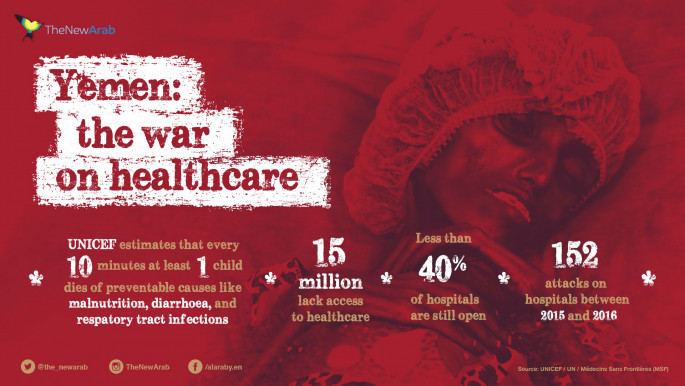Yemen's warring parties waging relentless offensive on healthcare
The sick and wounded and medical staff providing them with care, as well as hospitals and ambulances, are covered by neutrality in conflict and should never be targeted under international humanitarian law.
In 2015, the UN recorded 59 such attacks. In 2016, UNICEF recorded 93 attacks. The international committee of the Red Cross recorded more than 160 attacks between March 2015 and March 2017.Both the Saudi-led military coalition and Houthi rebel forces are guilty of illegal attacks, the report says.
"Parties to the conflict have damaged or destroyed medical facilities through airstrikes, shelling, or using improvised explosive devices; threatened, intimidated, detained, abducted, and killed medical personnel; shot at and stolen ambulances; and denied passage at checkpoints to persons attempting to receive lifesaving treatment or deliver essential medicines and supplies."
Justin Armstrong, Yemen acting director of medical NGO Medecins Sans Frontieres (MSF), told The New Arab: "It is difficult for patients and caretakers to move around as there are risks in accessing healthcare, and medical staff struggle to access communities blocked off by conflict."
MSF endured four attacks on its medical facilities in the last two years, and in 2016 it withdrew its staff from three sites due to shelling of Abs hospital in Hajjah governorate, causing 19 deaths and 24 wounded, including a MSF staff member.
Although operations have now resumed, attacks remain a threat: "It is not always possible to work on our terms, to ensure that our staff are given the safety and autonomy to make decisions based on solely medical concerns," said Armstrong.
More recently, MSF staff at Al-Thawra hospital, in Ibb governorate, were threatened to work at gunpoint by Houthi militia, prompting the organisation to withdraw its staff. Operations will continue under local staff's supervision.
 |
|
More than half of Yemen’s population lack access to basic health care according to the UN, and UNICEF estimates that every 10 minutes a child dies of preventable diseases.
"No child should die of a respiratory tract infection," said a doctor interviewed for the report.
"But here in Yemen they are, because the war is targeting the health sector."
“We cannot afford health care. If any of our children gets sick, we cannot do anything for them. We do not know where to go,” said the mother of 13-year-old Zuhair, who suffered injuries from a bomb blast while attending a funeral with his family.
“If one of our children dies, God forbid, we would not be able to afford to buy a shroud. Two of my daughters, 5 and 3 years old, have persistent coughs, and I can’t help them apart from giving them hugs,” she said.
Humanitarian NGOs call on the UN Secretary-General to list Saudi Arabia as a perpetrator of grave violations against children in conflict zones in its 2017 report.
Last year UN Secretary-General Ban Ki moon removed Saudi Arabia from the list of children’s rights violators after Saudi Arabia reportedly threatened to cut funding to the UN.
Paola Tamma is a freelance investigative journalist who recently graduated from City University, London. She is currently researching Yemeni issues and society. Follow her on Twitter: @paola_tamma



